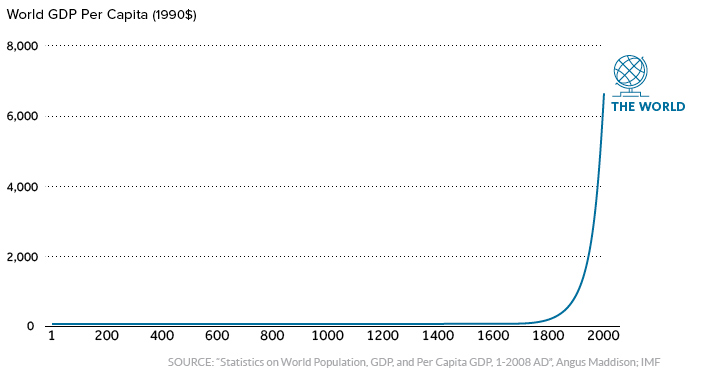-
 BC
14.2kTree rings tell the tale, as do lake sediment cores (looking at pollen grain). I don't know how many records from back then commented on the weather. Besides, they were in the middle of it and may not have realized they were in an epoch of nice weather. Unless events happen fast enough, we don't necessarily see the pattern. The people who shifted from hunting and gathering to agriculture almost certainly didn't know that's what they were doing. It was too slow a process.
BC
14.2kTree rings tell the tale, as do lake sediment cores (looking at pollen grain). I don't know how many records from back then commented on the weather. Besides, they were in the middle of it and may not have realized they were in an epoch of nice weather. Unless events happen fast enough, we don't necessarily see the pattern. The people who shifted from hunting and gathering to agriculture almost certainly didn't know that's what they were doing. It was too slow a process. -
 Cartuna
246
Cartuna
246 -
 Cartuna
246
Cartuna
246
Good old Hendrick Lovely not? Dutch skating. On friese doorlopers. Fun in hard times. People were happy though, I guess. -
 BC
14.2kAre there trees that old? — Cartuna
BC
14.2kAre there trees that old? — Cartuna
There are trees that old (probably not in Europe where trees tended to get cut down for lumber and were replaced by new trees). Actually you don't need the tree in the ground. There is a "Dendrochronological Database" that has been put together over the years which covers about 11,000 years into the past. You can take a core from a beam in a building and look it up in the database, to see what the climate was like from year to year -- wet, dry, warm, cold. During warm wet years the trees grew more, so the rings are wider. Cold dry seasons produce narrow rings.
I don't actually know anything about this, I just come across it in books about... medieval or ancient history.
BTW, there is a specific tree, a great basin bristlecone pine, that is over 5,000 years old. No, you can't go see the tree; it's location is secret. If the assholes of the world knew where the tree was, it wouldn't be there anymore. -
 Cartuna
246
Cartuna
246 -
 ChatteringMonkey
1.6k
ChatteringMonkey
1.6k
GDP tracks energy consumption.
Rise in energy consumption has mainly been a rise in fossil fuels.
The idea that fossil fuels can - for intents and purposes of the kind of economy we have - just be replaced by renewables seem wishful thinking at best.
Ergo, If we want/have to cut out fossil fuels, GDP will decline... one way or another. -
TheMadFool
13.8kAs a generalization, there have been periods of real growth. For instance, the post WWII boom brought real growth (increases in real income) for about 30 years. During the last 45 years, real wages have decreased by a minimum of 25% for most working class people. The cause has been stagnant wages and inflation.
Now, if you want a period of time when economic growth was a real drag, take the period between the collapse of the Roman Empire (say, 600 a.d. to around 1400 a.d. for a round figures) the annual growth rate was 1/100th of a percent. People could look forward to a 1% increase in income per century. As it happens, those 800 years were not terrible for everyone. Life was just very stable. — Bitter Crank
So, net zero growth is not gonna be as problematic as some of us would think. After all if a growth rate of 1/100th of a percent can be maintained over roughly a millennia, it doesn't seem to be all that bad for us. -
 ChatteringMonkey
1.6kFrom a societal and psychological/epistemic point of view, the problem is we have been living exclusively on the sharp end of the hockey-stick.
ChatteringMonkey
1.6kFrom a societal and psychological/epistemic point of view, the problem is we have been living exclusively on the sharp end of the hockey-stick.
Our experiences, and the socio-economic structures we build thereupon, are literally fully contained within the couple of centuries that are the exception.
We are geared to expect the future to resemble the past, but have no real right to it dixit Hume. In most cases that kind of wiring has served us well... in this case maybe it won't? -
 Cartuna
246
Cartuna
246 -
TheMadFool
13.8kBTW, there is a specific tree, a great basin bristlecone pine, that is over 5,000 years old. No, you can't go see the tree; it's location is secret. If the assholes of the world knew where the tree was, it wouldn't be there anymore — Bitter Crank
:rofl: :up:
Welcome to The Philosophy Forum!
Get involved in philosophical discussions about knowledge, truth, language, consciousness, science, politics, religion, logic and mathematics, art, history, and lots more. No ads, no clutter, and very little agreement — just fascinating conversations.
Categories
- Guest category
- Phil. Writing Challenge - June 2025
- The Lounge
- General Philosophy
- Metaphysics & Epistemology
- Philosophy of Mind
- Ethics
- Political Philosophy
- Philosophy of Art
- Logic & Philosophy of Mathematics
- Philosophy of Religion
- Philosophy of Science
- Philosophy of Language
- Interesting Stuff
- Politics and Current Affairs
- Humanities and Social Sciences
- Science and Technology
- Non-English Discussion
- German Discussion
- Spanish Discussion
- Learning Centre
- Resources
- Books and Papers
- Reading groups
- Questions
- Guest Speakers
- David Pearce
- Massimo Pigliucci
- Debates
- Debate Proposals
- Debate Discussion
- Feedback
- Article submissions
- About TPF
- Help
More Discussions
- Other sites we like
- Social media
- Terms of Service
- Sign In
- Created with PlushForums
- © 2026 The Philosophy Forum





